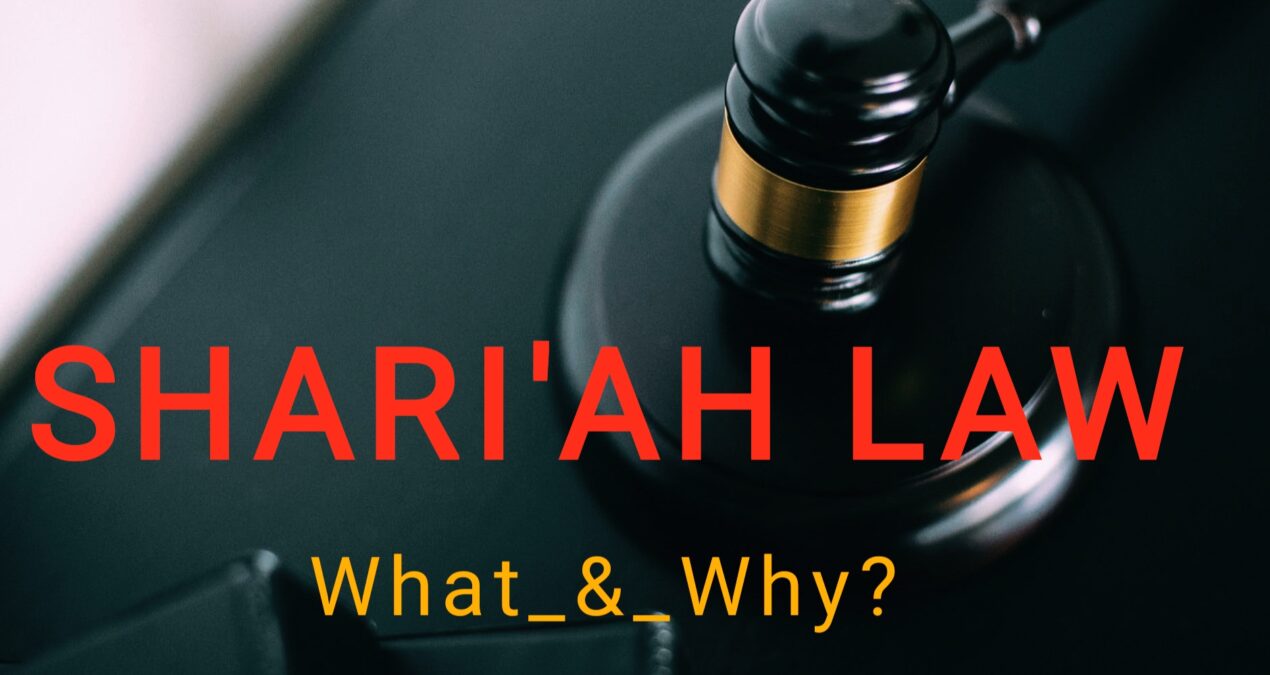There was a time when Afghanistan was a modern state, faith was a private matter, burkas were optional woman and men could travel together. Right next door Iran was not far behind; it was at far with the western world. Women could step out without a wheel, even meet men at public places but the Iran and Afghanistan of today are a lot different. Today HIJAB IS MANDATORY. Western clothing is frowned upon clerics dictate societal norms, religious police patrols the streets and civil rights are all but non-existent. What happened in these countries? They came under the Sharia Law.
Today let’s discuss the most controversial concept in the world, The Concept of Sharia. It’s back in the news after the Taliban took over Kabul; they plan to rule Afghanistan under the Sharia Law under the Taliban’s version of the Sharia Law. What does that mean? What will change in the Afghanistan? What place does the Sharia have in this day and age? How many people in the world follow it? Why is it so controversial? Why does the world fear it will take Afghanistan further back in time?
What is the Shari’ah Law?
To begin with the first question, ‘What is the Shari’ah?’ To many the word conjures horrors of hands being cut off of adulterers being beaten and women being oppressed. In fact no religious law has ever had worse press as the Sharia has in recent times. Why is that so? Thanks to the Misrepresentation, Manipulation and Misuse of Sharia by whom! The Islamic regimes, politicians, clerics, radicals, terrorists. They’ve all used the Sharia to rule in the name of God.
So, returning back to the question about The Sharia Law. Well there is no clear definition, different people understand and apply the Sharia in different ways but if we put the broad concept together the definition will sound like… The Sharia is Islam’s legal and spiritual system, both divine and philosophical. Divine because it is said to be God’s will for humankind and Philosophical because it is based on the human understanding of what that divine will is.
In Arabic, the SHARIA translates to “the clear, well-trodden path to water”. The human interpretation of Sharia is called the FIQH which literally means “human understanding”. Now these terms are used interchangeably but they are not the same.
SHARI’AH VS FIQH

Sharia is considered divine permanent infallible but its understanding is human. It’s a set of rules put together by Muslim scholars over the centuries. These rules have been drafted and applied to suit those in power.
The sources of Sharia Law, where do the Rules come from!!!
The three sources: The QURAN which is “Islam’s Holy Book”, The SUNNAH which is basically the “Deeds of Prophet Mohammad” and The HADITH which is the “Sayings of the Prophet Mohammad”.

There’s a range of other sources to work out how God wants Muslims to live but there is no single law book, no definite statute, no set judicial proceeding to determine what the Sharia is… It’s basically a vast collection of different often conflicting interpretations. These interpretations gave birth to five schools of thought, the five legal schools of Sharia and you must know this.
5 SCHOOLS OF THOUGHT
There are different kinds of Sharia you would say. Hanbali (Founder: AHMAD IBN HANBAL), Maliki (Founder: MALIK IBN ANAS), Shafi (Founder: MUHAMMAD IBN IDRIS ASH-SHAFI’I) and Hanafi (Founder: ABU HANIFA AN-NU’MAN); these four belong to Sunni Islam and the fifth is the Shia version of Shria and it’s called Ja’fri. All five of them are named after theologists and jurist, the men who interpreted Islamic texts.
Now look at this map, the Hanbali School is the smallest and strictest of them all. It’s primary source is the Quran, it is practiced in Saudi Arabia and Qatar, it also has significant followers in Syria, Bahrain, UAE, Yemen and Oman.
The Maliki School of Sharia relies mostly on independent understanding of the Quran. It is predominantly found in African nations. The whole of West Africa along with Chad, Sudan and Kuwait.
The Shafi School of Sharia relies on consensus over understanding of the Quran and this is where it’s followed: East Africa and South-east Asia in countries like Somalia, Eritrea, Ethiopia, Egypt, Djibouti, Maldives, Indonesia and small communities in Malaysia.
Furthermore we have the Hanafi School, the earliest, the most flexible version of the Sharia, it relies both on consensus and independent reasoning. This school has the largest number of followers, approximately one third of the Muslims worldwide. They live in Turkey, Jordan, Lebanon, Afghanistan, Pakistan, India, Egypt and Bangladesh.
Lastly we have the Ja’fri School of thought followed by only Shia Muslim; it is enshrined in the constitution of Iran. It also has a lot of followers in Iraq and small pockets of followers the world over.
So, we have five different versions of the Sharia. How are they different, not in the fundamentals of faith but in their practice? There are differences in how they pray, how they resolve legal matters, how they settle marital disputes, how they deliver punishment for certain crimes and this is understandable because no religion is uniform.
But the problem begins when religion is mixed with governance. Many Muslims who embrace the Sharia thought of it as a substitute for the law of the land and that’s where the problem lies.
The Sharia was just supposed to be a way of living, it was not meant to be associated with political power. When European colonialism began to spread the crown and the church came together, the church was used to further the interest of the rulers. The same thing happened in Muslim kingdoms and while European nations later separated the church from the state, many Islamic countries did not.
THE INFLUENCE OF COLONIALISM
France, Britain and other European powers had colonized much of West Asia, Africa and Asia. When they left, leaders of the newly formed Muslim majority countries faced the dilemma. Should they govern based on the previous Islamic values? Or should they embrace laws inherited from colonial rule?
Well they chose the Sharia as the basis of their legal justice system and this gave birth to all kinds of theocracies, hard-line and moderate.
NATION THAT ADOPTED SHARI’AH
Countries like Algeria, Libya, Egypt, Sudan, Syria, Iraq, Oman, Pakistan and Yemen they all had the Sharia. Even countries which were not colonized by the West adopted the Sharia.
In 1932, Saudi Arabia was formed as a theocratic monarchy.
In 1979, Iran witnessed an Islamic revolution, until then Iran was a secular monarchy. After the revolution the clerics took power and the country became an Islamic Republic.
In 1996, the Taliban seized power in Afghanistan and they made it a terror regime based on the Sharia.
What makes this law acceptable in some countries and horrific in others? The answer would be its understanding and implementation. Some countries enforce the most discriminatory and patriarchal aspects of the Sharia.
They selectively picked certain verses from the Quran and legalized draconian practices like polygamy, triple talaq, and genital mutation. They also enforced rules that had little or no basis in Islam. Research shows that most of these punishments were not sanctioned in the Quran; they were not practiced by the prophet.
Yet today they’ve made the highlights of the Sharia, they’re being used to dictate daily lives of Muslims the world over. A lot of followers do not understand this; they just stubbornly uphold ignorant and unjust practices. The biggest victims of this are Muslim women.
Does God judge differently based on gender? For many clerics it does, despite the fact that women worked and fought alongside the prophet. In many countries women cannot step out without “an abaya” (or a veil) but men can dress the way they want. Women cannot stand for president but men can govern for a lifetime. Women cannot choose to have an abortion but men are allowed to have four wives. Women cannot travel without a male guardian, women cannot drive, women cannot retain custody of their children after divorce and they receive half of what is awarded to their brothers in inheritance.
The list of restriction on women in the name of God is appalling and the Sharia misuse does not end there. It is cited to justify what they call the conquest mindset to wage wars in the name of Islam especially by terror outfits, who portray themselves as more faithful than other Muslims. They use religious scholars in their ranks to make finely crafted arguments to use religion as a pretext to perpetrate violence. They exploit people who have little understanding of Islam. They recruit them as foot soldiers to fight their politically motivated wars. Some join them in the name of faith, some in the name of their land, some for a good paycheck and some because they’re just murderous but this is not the Sharia.
A lot of damage has been done in the name of religion by people from all faiths, by people from all cultures that are true for the Sharia too. Yet it remains a way of life for 1.8 billion followers of Islam in more than 57 countries. Does that make it acceptable? Who decides and in which form?
As per my opinion all things including religion must evolve with time. If some practices are outdated, they must end. Religious law may not have a place in modern nation-states governed by a constitution. If the Sharia’s interpretation and practice clashes with today’s way of life and social structures then perhaps it’s time for revision and reflection rather than resentment.
Thanks for reading till now… Hopefully this article updated you, if you like this and want more such topics over here, don’t forget to mention them in the comment box below…
Src credit: Internet












K M Mishra
Well
Good enough courage to write on this topic, hope everyone will understand and take in positive way.
Prerna Mishra
Well done girl ❣
Anonymous
More power to u for having the courage to write truth.